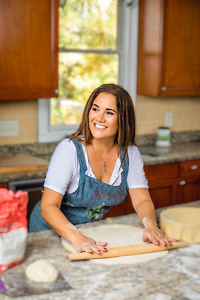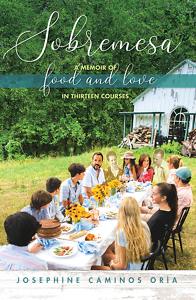An Unspoken Language
Josephine Caminos Oría’s Sobremesa celebrates family and food
Some books will make you hungry; some will make you want to cook even if you don’t love cooking; and some will make you wish you’d been born in another country — to a culture where sitting around a table with loved ones is the national pastime. Sobremesa: A Memoir of Food and Love in Thirteen Courses did all three for me. The second book by Argentine-American cookbook author Josephine Caminos Oría, the memoir is a delicious paean to her roots and to the culture that informs her life’s work.

To understand the term sobremesa is to understand the importance of food and family in Argentine culture. It is the most important part of a meal — the sharing at the table afterward with the people gathered there, telling family stories and enjoying each other’s company. Oría writes that sobremesa “was a means for my parents to pass on their Argentine traditions and culture beyond DNA. It satiated a hunger in me that food alone never could, tethering me to an Argentina that had always seemed worlds away.” Born in Argentina and brought to the U.S. as a baby, Oría describes her upbringing as bicultural as well as bilingual. This was the compromise that many Argentine immigrants made in order to keep their culture alive in America where a slower pace of life was not the norm.
Every chapter of the book deals with a significant event in the author’s life, and each is wonderfully anchored with an important family recipe. For example, Oría describes her grandmother’s sopa pastina that nursed her back to health when she was in a serious car accident at age 16: “The bone broth could cure most illnesses, heartbreak or even mental anguish.” After she breaks up with her longtime boyfriend, her mother’s mushroom sandwich made with lots of butter and soft white bread becomes a comforting snack, accompanied by advice only a mother could give: “Eat. You know what they say, ‘Las penas con pan son menos.’ Sorrows with bread are less.”
In her 20s and with no real direction in life, Oría makes a pilgrimage back to Argentina to work on her family’s cattle ranch. There she meets and falls in love with a real gaucho — a tall, dark, and handsome local named Gastón. Between the incredible farm dinners, the flowing Malbec, and the witty banter as the two get to know each other, it was hard to put down the book and return to my boring American life. I found myself wanting to try every recipe and magically transform my dining table into a place where my family and I would linger over delicious food and wine and talk late into the night.
 The story — like most lives — is not all binge-worthy, made-for-Netflix scenes. Real life becomes difficult when, back in her childhood home of Pittsburgh and newly married to Gastón, Oría puts in long hours to support them while her husband, waiting for a green card, is unable to work. She gives birth to their first child and then becomes pregnant again soon afterward, but the second baby is born with health problems. Through it all, the newlyweds find comfort in the kitchen and the support of their families. On one of their trips back to Argentina, Oría’s father-in-law, also an avid cook and asado (grilling) expert, offers this wisdom: “Cooking is an unspoken language that only those who do it over and over again understand. Recipes are a lot like the rivers and lakes surrounding us. They’re never the same.”
The story — like most lives — is not all binge-worthy, made-for-Netflix scenes. Real life becomes difficult when, back in her childhood home of Pittsburgh and newly married to Gastón, Oría puts in long hours to support them while her husband, waiting for a green card, is unable to work. She gives birth to their first child and then becomes pregnant again soon afterward, but the second baby is born with health problems. Through it all, the newlyweds find comfort in the kitchen and the support of their families. On one of their trips back to Argentina, Oría’s father-in-law, also an avid cook and asado (grilling) expert, offers this wisdom: “Cooking is an unspoken language that only those who do it over and over again understand. Recipes are a lot like the rivers and lakes surrounding us. They’re never the same.”
As someone who uses cooking to get through many difficult times, I found this memoir a delightful journey through a culinary history and a life that was not my own. I learned about the tradition of drinking mate, a meaningful communal experience with friends or even strangers, and the Argentine custom of la merienda — tea, coffee, or mate served with special pastries in the afternoon, a reminder that life is meant to be savored and enjoyed daily, not just on special occasions.
It is inspiring to learn that Oría had the courage — as a mother of five in her 40s — to leave a successful career in healthcare to start a business making her beloved grandmother Dorita’s dulce de leche, the rich and creamy caramel-like indulgence that is found in so many Argentine desserts. It is a labor of love to be sure, but also a way of ensuring her grandmother’s spirit lives on: “It occurred to me then and there, sitting at Dorita’s table, that food is so much more than sustenance. It’s the feel of a place. It’s the essence of a person. It’s something language can’t get to. It’s memories tucked away deep inside all of us, reminding us who we are. It’s remembrances in the making.”

Joy Ramirez holds a Ph.D. in comparative literature. She taught Italian at Vanderbilt University and the Colorado College. She now writes and lives in East Nashville.


